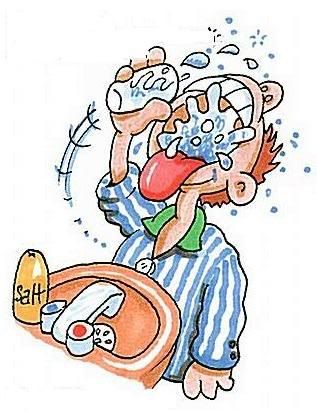 Tonsillitis is an inflammation of the tonsils, the fleshy clusters of tissue on both sides of the back of the throat that fight off germs that enter the body through the mouth. The tonsils become enlarged and red, and can be coated with a yellow, gray, or white substance.
Tonsillitis is an inflammation of the tonsils, the fleshy clusters of tissue on both sides of the back of the throat that fight off germs that enter the body through the mouth. The tonsils become enlarged and red, and can be coated with a yellow, gray, or white substance. All forms of tonsillitis are contagious. It usually spreads from person to person by contact with the throat or nasal fluids of someone who is infected. A person with tonsillitis will have a sore throat, fever, swollen glands in the neck, and trouble swallowing.
Treating Tonsillitis
How doctors treat tonsillitis depends on whether it was caused by a virus or by group A streptococci bacteria. Doctors often can tell the difference just by looking at the tonsils, and can detect strep bacteria with a rapid strep test or a throat culture.
If tonsillitis is caused by a virus, the body will fight off the infection on its own. If it's caused by strep bacteria, the doctor probably will prescribe an antibiotic. If so, make sure that your child completes the full course of treatment to prevent the development of any complications.
If your child gets frequent bouts of tonsillitis (more than 5 to 7 times during a 12-month period) or repeat infections over several years, the doctor may consider a tonsillectomy to remove the tonsils.
Caring for Your Child
Kids with tonsillitis need plenty of nourishment and rest. If your child finds swallowing so painful that eating is difficult, try serving liquids and soft foods, like nutritious soups, milkshakes, smoothies, ice pops, or ice cream.
Make sure that your child drinks lots of fluids and gets plenty of rest, and take his or her temperature regularly. Use a nonprescription pain reliever, such as acetaminophen or ibuprofen, for throat pain.
Be sure to keep your sick child's drinking glasses and eating utensils separate, and wash them in hot, soapy water. All family members should wash their hands frequently. After a bout of tonsillitis that's caused by the strep bacteria, throw out your child's toothbrush and replace it with a new one.
Preventing Tonsillitis
To prevent tonsillitis, avoid letting your child near anyone who already has tonsillitis or a sore throat. Make sure to practice good hand-washing habits, and teach kids to do the same.
If you think your child has symptoms of tonsillitis or has been exposed to someone who is infected, call your doctor.